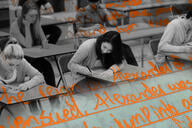You have /5 articles left.
Sign up for a free account or log in.
Deidra Faye Jackson earned her Ph.D. in higher education from the University of Mississippi in Oxford, where she teaches in the departments of writing and rhetoric and higher education. You can find her on Twitter at @DeidraJackson11.
My experience teaching first-year composition to university freshmen has revealed that the two academic writing worlds inhabited by undergraduates and advanced academics alike collide. Most budding scholars have yet to suffer the more unwelcome aspects of academia, such as the unpleasant pangs of impostor syndrome that struck (and still strike) many of us in grad school and beyond; however, when it comes to the academic writing process, many freshmen -- thanks to first-year composition classes -- will get a taste of some of the joys and pains that are familiar to early-career researchers.
By examining the comparison further, it’s instructive to note a few ways in which the frequent pursuit of academic writing, namely college preparatory and more advanced research, actually run parallel and unite instructors with the undergraduates we teach. For example, learning new formatting styles and completing exercises and prompts aimed at increasing writing engagement have been featured in both undergraduate and graduate courses. They are all intended to coax and fine-tune effective writing from fledgling as well as more seasoned academic writers.
Instructors, let’s be honest. Perhaps nothing drains the light from first-year writers’ eyes quicker than introducing them to (or forcing upon them) a new formatting/citation style. It may sound a bit melodramatic, but when you’re requiring students to learn any of the major styles -- APA, MLA or Chicago -- it may be challenging to get them up to speed, especially if a format differs from the one they were introduced to in high school -- that is, if they were exposed to a style at all. (Shout out to APA style, whose admins last August announced breaking news: guidelines call for placing only one space (not two!) after a period that ends a sentence. I’m always moved by changes in long-standing traditions, such as this one, but sadly, neither my students, nor the few colleagues I told were impressed by the news.)
Many of us recall enduring similar learning curves as grad students, having to become adept at a formatting and citation style with increasing demands placed on our scholarly output. One of my undergraduate students referred to his high school teacher’s marks on his English papers as resembling “capillaries.” I felt my student’s pain. Receiving your first research paper rejection or first-ever reviewer edits of a paper you’re trying to get published can be brutal. It also reminds me of my first academic research paper when I used an incorrect style whose handbook I gleaned from the internet. As expected, there were marks on my paper.
The start of another new semester of freshman comp means that I work to acquaint freshmen with the regular process of frequent writing. I and other writing instructors aspire to engage students in (more informal) writing immediately and regularly. We direct them to respond to prompts, whether they are blogging, journaling or dialoguing with their peers, all academic writing exercises that are invaluable for graduate student researchers, as well, to allow instructors to evaluate early writing qualities such as clarity, voice and tone, with stricter assessments of spelling, grammar and punctuation to come later.
A writing prompt that my students seem to relish -- because they can use “I” and expound on something meaningful to them -- is the literacy narrative. Using first-person voice, they describe some noteworthy aspects along their lifelong journey to reading and writing. Their experiences usually comprise an interesting and engaging mix. Undergrads have fondly recalled the cherished books and novels they read in elementary and junior high school, teachers whose influence coaxed them to become better writers, and reflective struggles to overcome dyslexia and other learning disabilities.
The students’ enthusiasm with this prompt is reminiscent of my and my peers’ eagerness and high regard for writing our researcher subjectivity statements in which we reflected on who we were as researchers, in relation to what and/or who we were studying. In addition, it seemed liberating to contemplate that question and explore our researcher biases, namely, because we knew it would be a chief part of our academic work and put us that much closer to completing our dissertations and theses.
Another striking piece of connective tissue that unites freshman writers and grad students/early-career researcher writers is the shared feeling that they have reached breaking points. To the undergraduates and advanced peers who considered quitting during their tenure because they felt overwhelmed, I usually tell them that it will assuredly get harder, and to explore coping strategies and to practice self-care. I encourage them to learn how to seek out the best approaches to help them persevere through tough academic times. In another show of commonality, both groups will need them now and beyond.
Can you draw parallels between undergraduate writing and academic research writing? What techniques or instructive lessons proved most effective with your experience with academic writing? Tell us about it in the comments below or on Twitter!
[Photo by Gift Habeshaw on Unsplash.]




